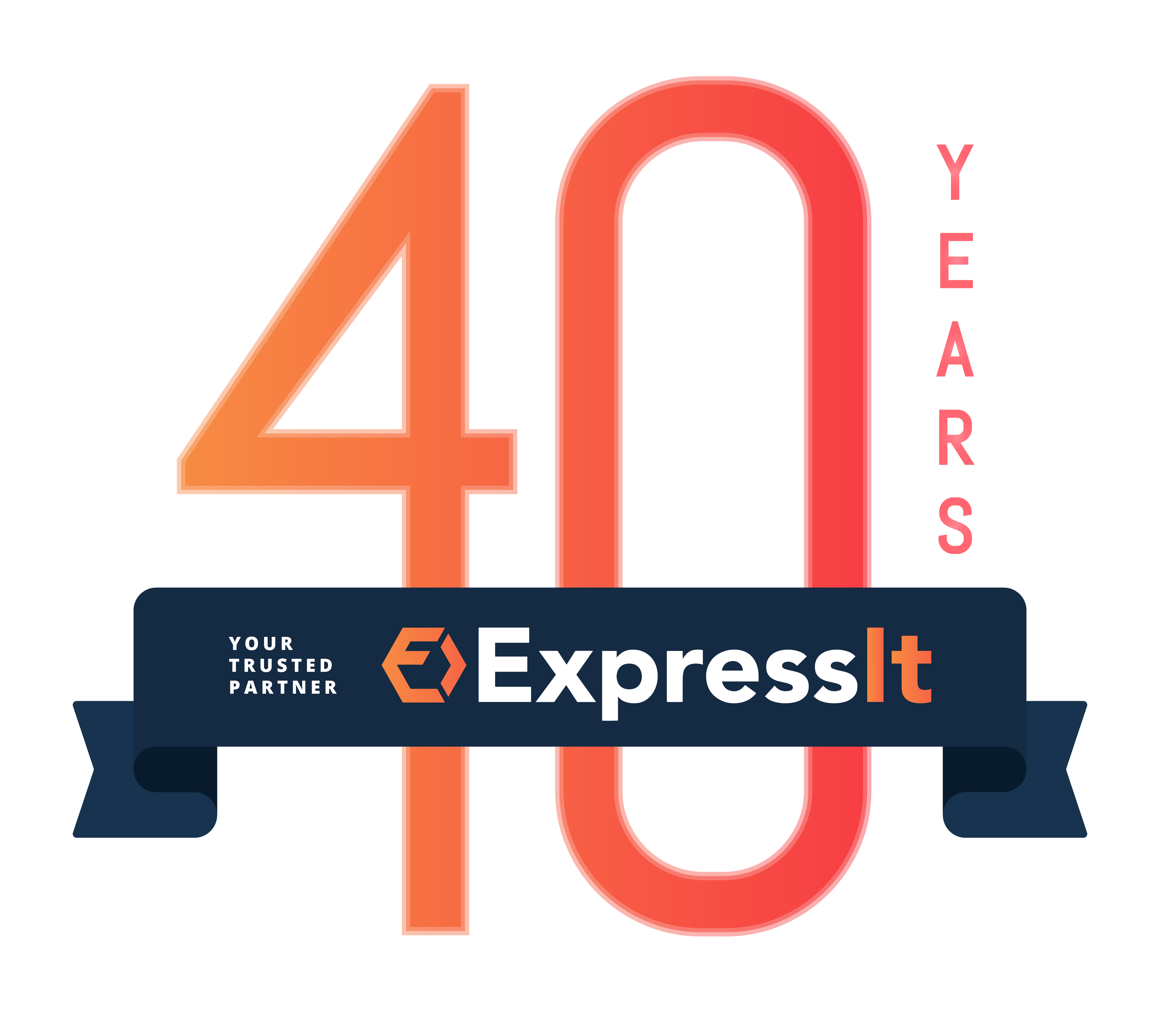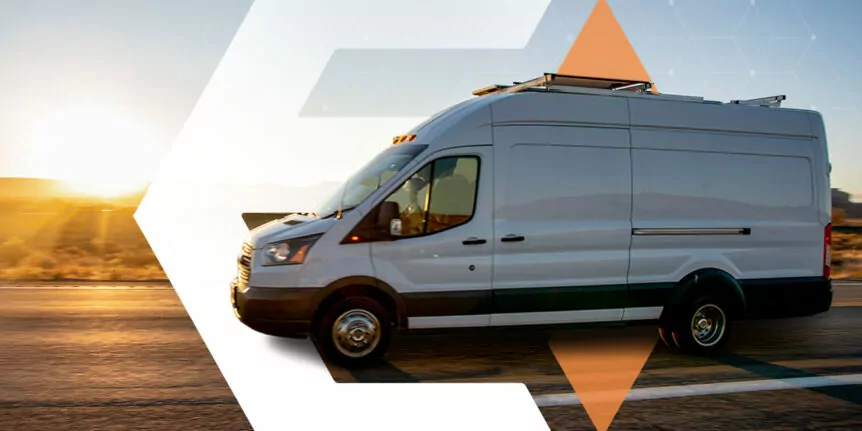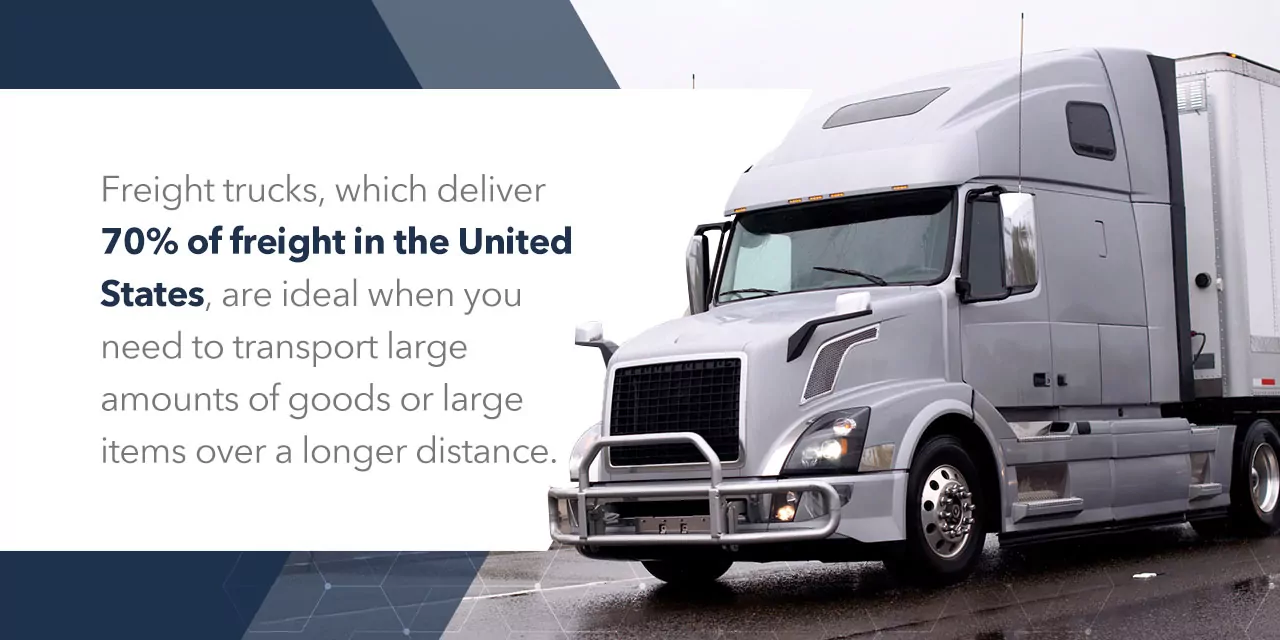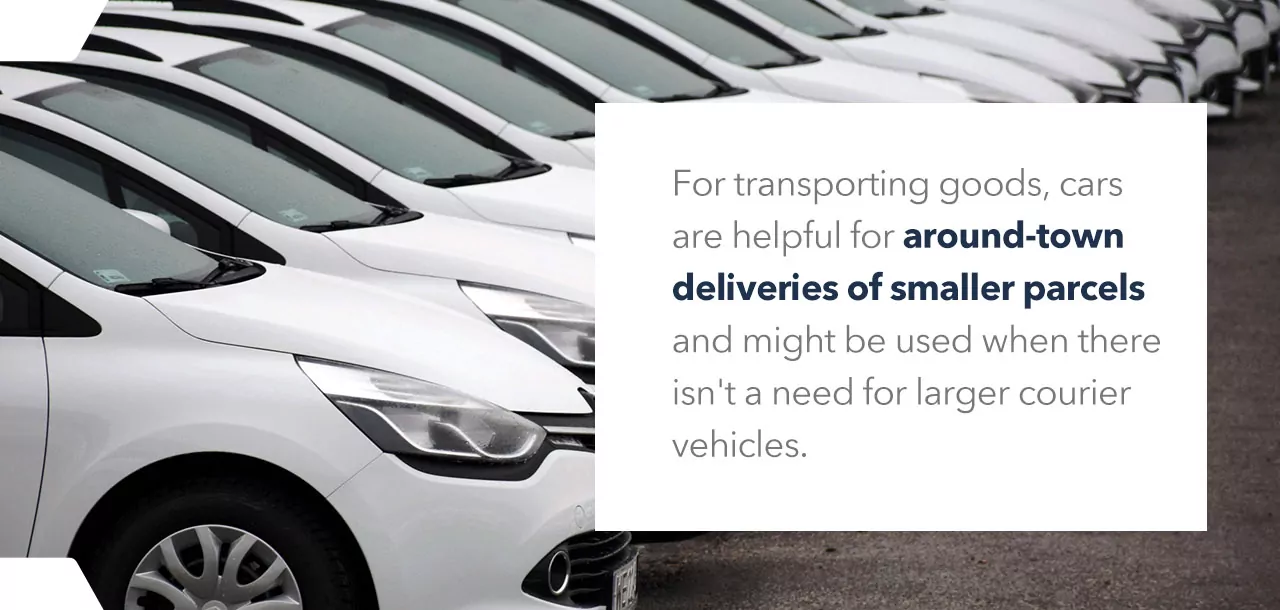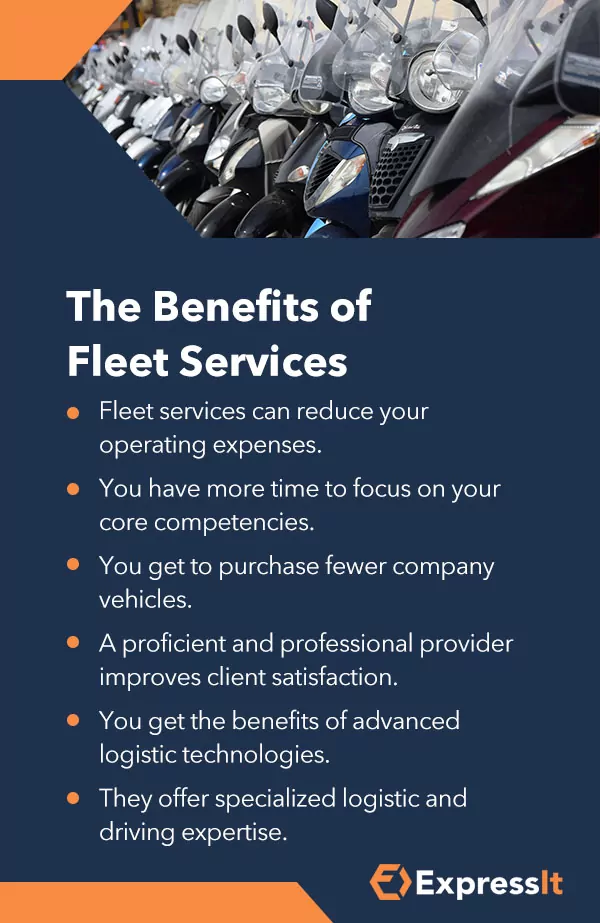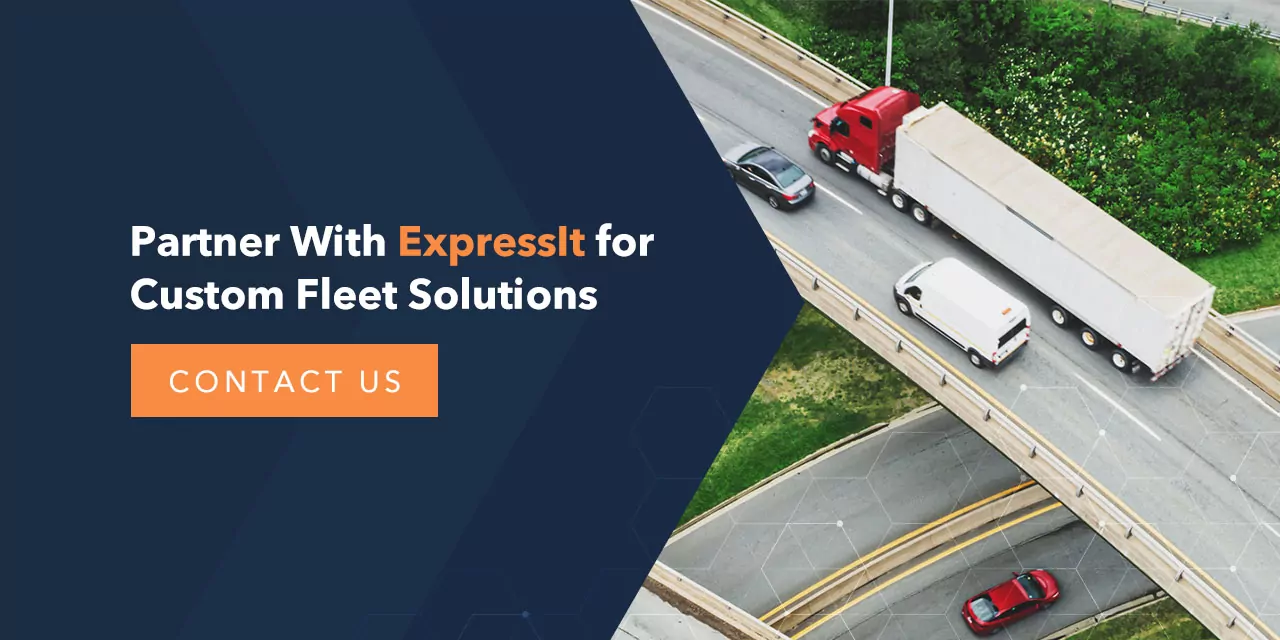A fleet of any kind is a group or collection of vehicles a company uses to pursue its business objectives. It can range from trucks to cars or be a combination of different types. The vehicles that make up a fleet are owned or leased, or the transport is outsourced to logistics partners. Many businesses and organizations rely on a fleet of vehicles in one way or another, and no two fleets are alike. Your company may require a collection of the same vehicle or prefer to diversify for your B2B needs.
Some companies prefer to have in-house logistics departments responsible for overseeing vehicle management. The extra duties include tracking vehicles via GPS, communicating with drivers, controlling fuel expenses and servicing vehicles.
What Is Considered a Vehicle Fleet?
A fleet vehicle is any form of transportation, such as a car, van or freight truck — a collection of these make up what is considered a fleet. The private and public sectors use fleet vehicles, often allowing people to employ other vehicles besides their private ones. For instance, a company may own a fleet of company cars that employees can use both on and off the clock. This encourages uniformity and offers an additional perk to the employee.
Fleet vehicles transport goods or people, and companies often maximize the opportunity for mobile advertisement with wraps or decals advertising their business.
Examples of fleet vehicles in daily use you will have noticed on the road are police cars, ambulances and taxi cabs. There are others, such as fast food motorcycle deliveries, which are clearly branded and whizz about delivering food on time.
Common Types of Fleet Vehicles
Different types of vehicles make up fleets — each has its ideal functions, pros and cons. Whether you own a fleet, hope to expand your current range of vehicles or wish to outsource your transport logistic needs, it’s good to know what vehicles are most commonly used.
Your fleet requirements may be small, consisting of only two vehicles or large-scale with tens of cars and trucks. What you include makes all the difference. Common fleet vehicles include:
Freight Trucks
When you take a trip along any interstate, you will spot the numerous freight trucks carrying cargo to and from locations. There are multiple types of trucks with different types of trailers, all carrying different products and materials headed for various destinations.
The freight truck is part of the more traditional idea of a fleet vehicle. Various types of freight trucks offer different functionality. The semi-trailer or tractor-trailer is the big rig that transports large loads nationwide.
These trucks are versatile means of delivering your goods and products across long distances. The most common freight trucks are:
- Semi-trailer
- Flatbed
- Step deck
- Reefer, or refrigerated trailers
- Tanker
Freight trucks, which deliver 70% of freight in the United States, are ideal when you need to transport large amounts of goods or large items over a longer distance.
Your business may choose freight trucks for these advantages:
- Excellent for shipping large volumes
- Cost-effective for long distances
- Easy to track and monitor cargo
- Easy to price and quote
- Versatile to transport a variety of goods
The potential drawbacks of freight trucks include:
- Can get delayed due to road and weather conditions
- Increase in price over longer distances
- Move slower than other modes of transport
- Are complicated to drive
- Involve more compliance requirements
- Take more time to unload
Box Trucks
Like freight trucks, box trucks can travel between cities delivering and transferring goods. They are more often seen in cities because it makes more sense to transport items in bulk on a semi rather than make multiple trips with a box truck.
The more common uses are for moving vans or small to medium-sized businesses using them for daily work — often delivering goods. A local bakery might use a refrigerated unit to make cake and baked good deliveries. The roller-like cargo doors on many models make accessing the back of the truck easy so items can be offloaded quickly.
Choose box trucks for these advantages:
- Dispatched quicker than larger trucks
- Still carry large payloads
- Ideal for long and short trips
Keep these box truck qualities in mind:
- Less maneuverable in-city
- Due to size, trips require thorough planning in-city
Cargo Vans
Numerous vans are used for local deliveries — typically transporting goods and parcels from transit centers to their local destinations. These vehicles are not intended for long-haul drives, as the cost to transport items can mount up quickly over time.
Instead, couriers and local businesses choose these vans for their versatility and convenience. A box truck offers more space in general, but a fleet of cargo vans is cheaper and helps speed up getting things from point A to point B. Thus it is a staple among B2B courier delivery services as it allows employees to use their own vans, as ExpressIt Delivery does.
Consider cargo vans for their pros:
- Help get more drivers on the road
- Are more affordable than box trucks
- Are more fuel efficient in-city than larger trucks
- Are easy to drive and park
- Maneuver more easily in the city
- Enable quick deliveries
Keep these potential drawbacks in mind:
- Have smaller storage areas than trucks
- Carry less than larger vehicles
- Restrict the height of packages with lower roofs
SUVs
As a fleet vehicle, SUVs are flexible and ideal for transporting people and more cargo than cars or motorcycles. And among other reasons to consider an SUV, towing is sometimes a big decider. Buying an SUV gives you the freedom to tow large loads while being able to unhitch and ride off.
They have stronger and more powerful engines than smaller vehicles and offer greater ride height so drivers can confidently traverse the roads. When needing to travel to hard-to-reach places, often offroad, an SUV makes light of where other vehicles may struggle. For transporting people, on- or off-road, an SUV is an option that provides ample seating space and comfort, which big families or groups will appreciate.
Deciding whether an SUV is suitable for your fleet takes consideration and weighing up the pros:
- Offer more space than sedans or hatchbacks
- Transport goods and people
- Are easy to load and disembark
- Can get to harder-to-reach locations
- Can tow additional loads
- Offer multipurpose use
Compare those to the cons:
- Less cost-effective than other transport
- Less spacious than vans
Cars
Employees use company cars for business and personal reasons and log the mileage for each use. For business, they are used to get to and from work and travel to appointments and work sites. Doing this helps reduce rental car costs, particularly for long-distance business travel. Pool cars are a great way to reduce costs while transporting staff efficiently.
For transporting goods, cars are helpful for around-town deliveries of smaller parcels and might be used when there isn’t a need for larger courier vehicles.
There are reasons to include cars in your fleet of vehicles, like these pros:
- Quick delivery time
- Easy to dispatch
- Fuel efficiency, especially compared to larger vans and trucks
- No specialty license requirement
- Fast offload time
But keep these drawbacks in mind:
- Limited space for goods
- Expensive for long-distance courier services
Motorcycle
You may have noticed a uniformed rider zipping along on a neatly branded motorcycle, heading to make a speedy delivery to an eager customer. Pharmacies, fast-food restaurants, courier and postal services, and even emergency medical services include motorcycles in their fleets for various reasons. Still, the most common are speed and efficiency for local deliveries.
Although less ideal for transporting large items or mass quantities, there are reasons for including motorcycles in your vehicle fleet:
- Highly cost-effective to purchase and run
- Fuel-efficient
- Seamless navigation through heavy traffic
- Suitable for frequent short trips
- Suitable for last-mile delivery of small packages
Motorcycles may not suit your fleet due to these cons:
- Can only transport a few small packages
- Are not ideal for long-distance couriering
- Are less safe than cars, vans or trucks
What Type of Fleet Is Best?
Whether purchasing or renting fleet vehicles, deciding what fleet type is best depends on your company or business needs. Transport and logistics can make up a large portion of your budget, and you want to maximize this investment as much as possible.
You can outsource certain or all transport logistic needs to a reputable courier company that serves your industry and understands each company has unique requirements. There are several aspects they will consider when customizing your courier package.
Before jumping in and deciding on the best type of fleet for your operation, consider the following areas:
- Budget: How much you can afford to spend will inform all your decisions — from how many vehicles you have in your fleet to what make and model you get.
- Brand alignment: Use the types and makes of vehicles that align with your company’s brand. If you sell pharmaceutical products, you will have different needs than a plumbing supplies business.
- Amount of cargo: Knowing the quantity of freight you need to move will inform the type and size of vehicles you choose.
- Cargo size: If you ship more oversized items in bulk, you will need vehicles to accommodate this. A mattress manufacturer likely requires larger vehicles than a laptop company.
- Distance: You may need to transport cargo between cities more often than making deliveries in town, or you might only work locally.
- Routes: Planning out your routes gives you an idea of the types of roads, their quality and the sort of traffic to expect.
- Timeframes: This is vital to transport logistics as customers depend on timely delivery.
- Steps in transportation: Cargo transport may be direct. Often, though, there are multiple steps in the delivery chain. It is important to note which type of vehicle is responsible for each step.
- Vehicle specifications: Vehicles in the same category may have different storage sizes and engine performance.
- Safety features: Businesses need to consider the safety of their drivers and fellow road users.
- Vehicle versatility: Your company may require a vehicle for various uses. Therefore, you want to choose an option that meets these demands.
- Fuel consumption: This is an ongoing expense you must factor into general running costs.
- Maintenance: Choosing a brand and model that is easier to service and maintain might be beneficial.
- Purchase option: Depending on your budget, transport needs and staff size, you might choose just one or a combination of buying, renting and outsourcing.
The best vehicle fleet used in B2B transport will meet all those considerations, from the amount of cargo to maintenance and other costs. Your fleet should match your needs precisely and offer complete efficiency. In most cases, a business needs a combination of vehicle types for different steps along the logistics chain. This and other courier and logistic trends will help inform your final decisions.
The Benefits of Fleet Services
Deciding to start or add to your fleet can be covered or subsidized by a reliable third-party company. Finding a company that offers a range of services, from same-day to long-haul trucking services, could benefit your company greatly by taking on some or all of your transporting needs. They provide highly qualified drivers who ensure fast delivery using optimized routes and specialized services to match your industry needs.
Your company has its core business, and you could benefit from fleet services in different ways:
- Fleet services can reduce your operating expenses.
- You have more time to focus on your core competencies.
- You get to purchase fewer company vehicles.
- A proficient and professional provider improves client satisfaction.
- You get the benefits of advanced logistic technologies.
- They offer specialized logistic and driving expertise.
Some companies tend to use independent contractors. For peace of mind, opt for a fleet service that uses employee couriers, as this ensures service uniformity. There are differences between employee couriers and independent contractors, which is something to consider when choosing a logistics partner for your company.
Partner With ExpressIt for Custom Fleet Solutions
Your transporting and logistic needs are essential to keeping your enterprise running like a dream. Partnering with ExpressIt provides you the confidence of secure and on-time deliveries. We offer transport logistics across the Northeast and the willingness to expand our reach for clients. At ExpressIt, we understand the importance of strong B2B relationships — part of that is making deliveries as promised. That is why we offer customized solutions for your exact needs.
Our experienced employee drivers will ensure we meet your same-day and high-priority deliveries. With 40 years of experience, we know what it takes to make your fleet management flow smoothly with ease. To find out how we can tailor a package for you, whether big or small, contact us for a quote today!
